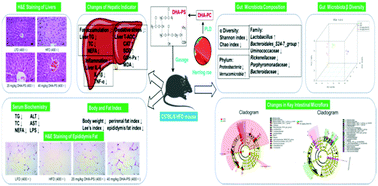DHA-enriched phosphatidylserine ameliorates non-alcoholic fatty liver disease and intestinal dysbacteriosis in mice induced by a high-fat diet
Abstract
Docosahexaenoic acid-enriched phosphatidylserine (DHA-PS) has attracted increasing attention because of its unique health benefits. In this study, DHA-PS was biosynthesized from DHA-enriched phosphatidylcholine (DHA-PC), which was extracted from herring roe, Clupea harengus. The ameliorating effect of DHA-PS on high-fat diet (HFD)-induced non-alcoholic fatty liver disease (NAFLD) was investigated using a mouse model. The DHA-PS treatment ameliorated NAFLD and effectively decreased the serum total cholesterol, triglyceride, non-esterified fatty acid, and low-density lipoprotein cholesterol levels and considerably increased the serum high-density lipoprotein cholesterol levels. Moreover, the DHA-PS treatment reduced the levels of liver-function enzymes and pro-inflammatory cytokines and also the oxidative stress indices. Furthermore, DHA-PS increased the diversity and richness of the beneficial intestinal microorganisms, suggesting its potential as a dietary supplement and functional food to combat HFD-induced NAFLD.



 Please wait while we load your content...
Please wait while we load your content...